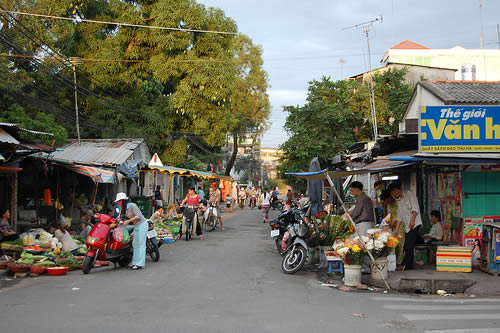Rather than seeking to eliminate the presence of the informal sector, urban planning should seek to accommodate this important component of urban economies.
 Urban planning in developing countries -- particularly in cities with rapid urbanization -- is facing a problem with the informal sector. The businesses that comprise the informal sector, typically operating on streets and in other public places, are often seen as eye-sores and undesirable activities. Thus, conflicts arise between urban authorities trying to keep their cities clean and the urban informal sector operators who need space for their activities.
Urban planning in developing countries -- particularly in cities with rapid urbanization -- is facing a problem with the informal sector. The businesses that comprise the informal sector, typically operating on streets and in other public places, are often seen as eye-sores and undesirable activities. Thus, conflicts arise between urban authorities trying to keep their cities clean and the urban informal sector operators who need space for their activities.
In many cases, authorities forcibly evict informal sector activities in the name of urban order and cleanliness. Yet, such eviction does not address the problem with the informal sector. It only relocates the problem and even exaggerates the conflicts between urban authorities and the informal sectors. Often many operators return to their places a few days after being evicted by the urban authorities.
Should urban planning accommodate the informal sector? Prior to the 1970s, there was no attention paid to economic activities carried out outside the formal economy. However, a few studies of developing countries began to explore the role of the informal sector, and the concept gained attention after a report by the International Labor Organization in the early 1970s.
Almost 40 years later, it's difficult to ignore the importance of the informal sector in many cities, particularly in developing countries.
In many developing countries in Latin America, Sub-Saharan Africa, Middle East and Asia, the informal sector accounts for most of the total employment. For example, the informal sector in Indonesia in 2004 accounted for 64 per cent of the total employment. The proportion of informal sector employment in urban areas was even higher during the economic crisis in the late 1990s when the closure of many manufacturing and service corporations pushed the newly unemployed into informal sector.

The growth of the urban informal sector is also nourished by the influx of migrants from rural regions surrounding urban agglomerations in search of work. With the formal sector unable to accommodate such large numbers of workers, the informal sector becomes the primary source of employment. Without the economic opportunities generated by such activities, the poor would certainly become a larger burden for the urban authorities.
It's also important to note that the informal sector is not only the domain of the urban poor. Many middle-class people in urban areas in developing countries greatly benefit from economic activities carried out outside the formal sectors.
The continuing study of urban informality has also revealed the important role of the informal sector in the process of urbanization. By linking various economic activities and urban spaces, the informal sector serves as a mode for urban transformation for many places. These findings seem to point to a need for new urban theories that can fully explain the phenomenon of urban informality in cities -- something mostly absent from urban theories such the urban ecology of the Chicago School and post-modern urbanism of the Los Angeles School, which are both rooted from cities in developed countries.
Yet, understanding the positive impact of the informal sector, many planners and officials still worry about the resulting urban blight. However, from urban environmental perspective, many of the problems associated with the informal sector are not attributes inherent to the informal sector but manifestations of unresponsive urban planning itself. The provision of spaces to informal sectors is an effective measure to reduce the environmental problems associated with such activities.
Accommodating – maybe even welcoming - the informal sectors in urban spaces will not only reduce the conflict between urban authorities and the informal sector, but also reduce the environmental problems associated, and eventually accelerate urban transformation and increase the quality of life in many developing urban areas.
Deden Rukmana, PhD is an assistant professor of Urban Studies at Savannah State University.

Analysis: Cybertruck Fatality Rate Far Exceeds That of Ford Pinto
The Tesla Cybertruck was recalled seven times last year.

National Parks Layoffs Will Cause Communities to Lose Billions
Thousands of essential park workers were laid off this week, just before the busy spring break season.

Retro-silient?: America’s First “Eco-burb,” The Woodlands Turns 50
A master-planned community north of Houston offers lessons on green infrastructure and resilient design, but falls short of its founder’s lofty affordability and walkability goals.

Test News Post 1
This is a summary

Analysis: Cybertruck Fatality Rate Far Exceeds That of Ford Pinto
The Tesla Cybertruck was recalled seven times last year.

Test News Headline 46
Test for the image on the front page.
Urban Design for Planners 1: Software Tools
This six-course series explores essential urban design concepts using open source software and equips planners with the tools they need to participate fully in the urban design process.
Planning for Universal Design
Learn the tools for implementing Universal Design in planning regulations.
EMC Planning Group, Inc.
Planetizen
Planetizen
Mpact (formerly Rail~Volution)
Great Falls Development Authority, Inc.
HUDs Office of Policy Development and Research
NYU Wagner Graduate School of Public Service

























